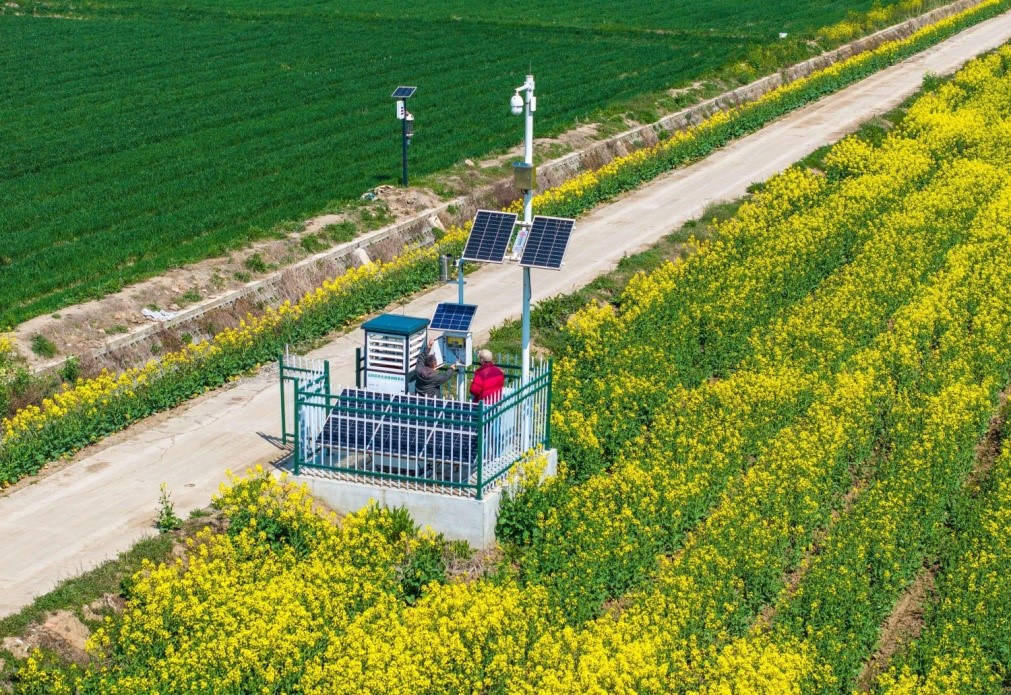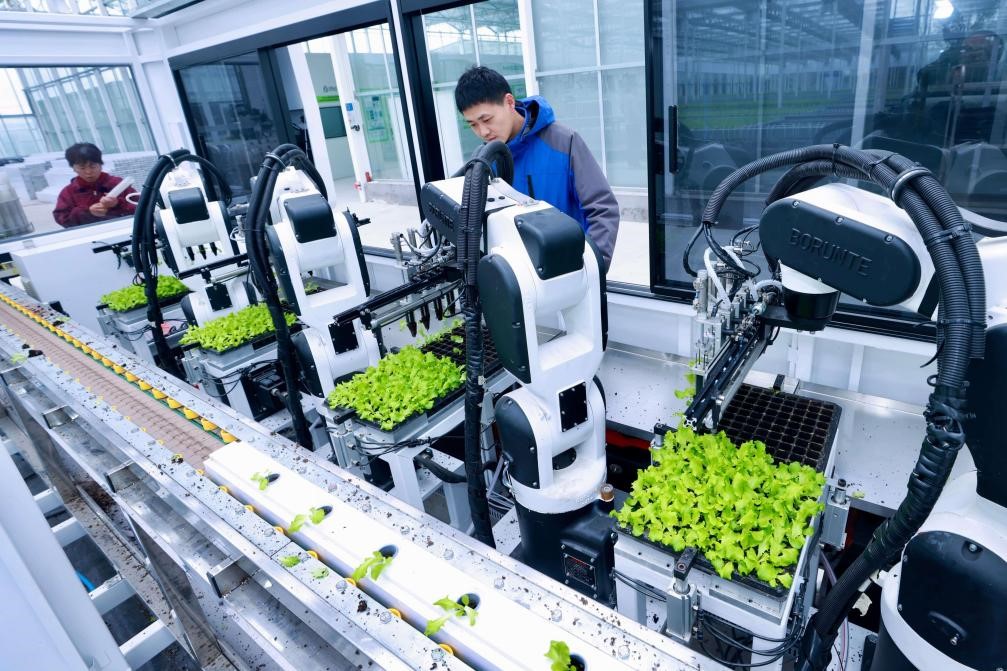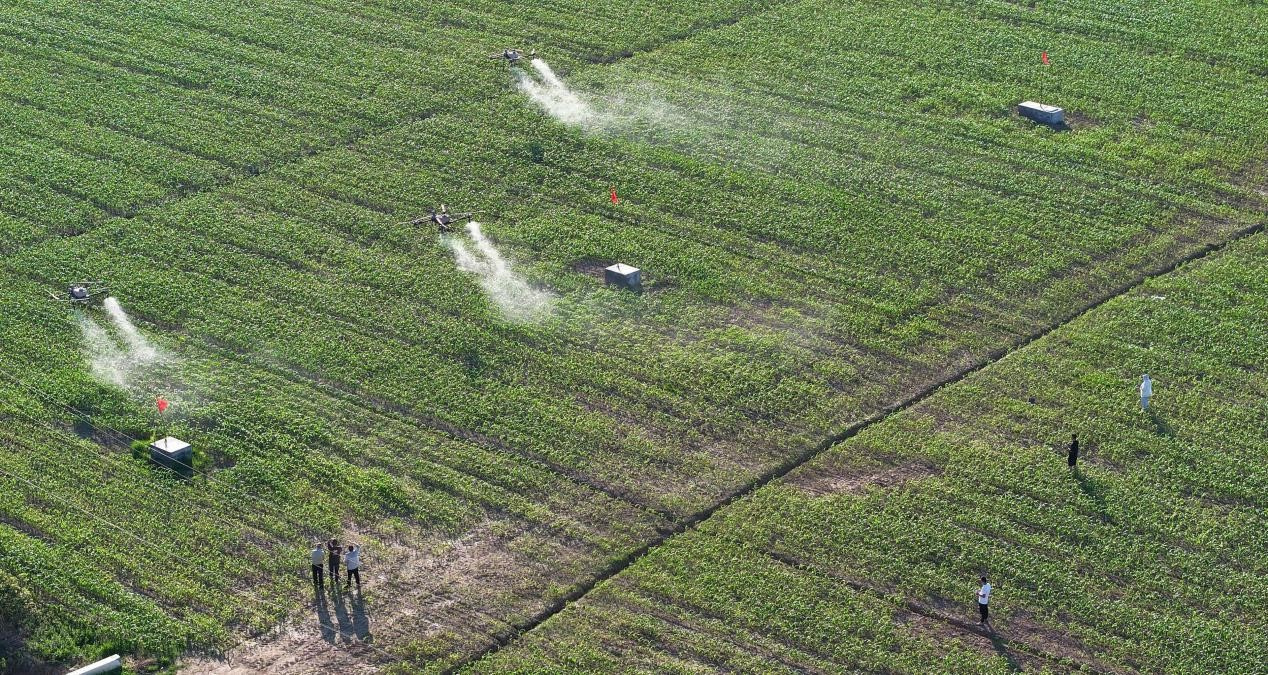
Agricultural technicians inspect and maintain a remote pest monitoring system at Fuxi Farm, Pingpu township, Wuhu, east China's Anhui province. (Photo by Xiao Benxiang/People's Daily Online)
Under the midsummer sun, late-season rice shimmers in paddies at Fuxi Farm in Xinlin village, Fanchang district, Wuhu, east China's Anhui province. Agricultural robots methodically traverse fields, monitoring crop conditions while embedded sensors collect real-time data on soil moisture, weather conditions, and pest prevalence - all transmitted to the farm's central command hub.
"This facility functions as the brain of the entire farm," explained Hou Guangyu, a Gen-Z agricultural manager, remotely operating robots via tablet. "Integrated smart systems allow comprehensive field management from the office."
China's agricultural landscape is undergoing a technological transformation as artificial intelligence, big data analytics, and low-altitude aerial systems expand their operational footprint.
Fuxi Farm is one of the smart agriculture pilot projects launched by the Chinese Academy of Sciences (CAS). Its successful model has now been replicated across Inner Mongolia, Chongqing, Anhui, and Hubei, moving steadily toward commercialization and large-scale application.
"Conventional farming involves significant unpredictability. Yet big data enables simulation and predicts analysis for every step - from planting schedules to irrigation protocols and pest control - so we can choose the best approach," said Zhang Yucheng, a senior engineer at the CAS Institute of Computing Technology.
At Fuxi Farm, tailored models and algorithms for moisture regulation, weather adaptation, and pest forecasting are being developed and refined to enhance precision agriculture, supporting both yield stability and productivity gains.

Robots plant lettuce seedlings at a smart agriculture demonstration park in Guangchen township, Punghu, east China's Zhejiang province. (Photo by Wang Zhijie/People's Daily Online)
According to an official with China's Ministry of Agriculture and Rural Affairs, smart farming systems are being deployed across crop cultivation, livestock breeding, and aquaculture sectors. These integrated platforms enable intelligent sensing, resource decision-making, and process control, significantly elevating labor productivity, resource utilization efficiency, and per-unit land output.
Illustrating this trend, an autonomous inspection robot developed by Muyuan Foods Co., Ltd. serves as a digital veterinarian at a smart livestock farm in Dahualing village, Neixiang county, central China's Henan province. Equipped with multiple sensors, it continuously monitors animal biometrics and alerts technicians to abnormalities.
"Infrared thermography and smart thermometers detect abnormal temperature fluctuations," explained Hu Yiyong, head of intelligent diagnostics at the company.
Meanwhile, in Laizhou, east China's Shandong province, industrial aquaculture facilities are using intelligent feeding systems that factor in fish behavior and growth patterns to deliver precise amounts of food. "The system learns from observational data to refine behavioral modeling and algorithmic precision," said Li Wensheng, deputy general manager of a local aquaculture company.
In October 2024, China's Ministry of Agriculture and Rural Affairs released a national smart agriculture action plan for the period of 2024-2028. According to the plan, by the end of 2026, public service capacity for smart agriculture should be initially established, with over 30 percent of agricultural production processes becoming information-driven. By the end of 2028, informatization coverage is expected to exceed 32 percent, with smart technologies becoming primary drivers of cost reduction and yield enhancement for key crops and livestock.
"Effective drought response or pest containment demands both speed and precision, which requires complex backend systems," said Ren Ni, head of the Institute of Agricultural Information at the Jiangsu Academy of Agricultural Sciences. She identified validated data streams, robust algorithmic frameworks, and resilient equipment as foundational elements of functional smart agriculture.
China has established 34 national-level smart agriculture innovation centers and sub-centers, and 35 agricultural information technology laboratories, achieving breakthroughs in high-throughput crop phenotyping, on-site soil analysis, and large-scale robotic platforms.
Nevertheless, experts also acknowledge the challenges of large-scale deployment. The country's diverse geography, climate zones, and crop-livestock heterogeneity complicate standardized algorithm development and equipment design, requiring integrated systems that balance scalability with cost efficiency.
While developed countries enable single operators to manage over 5,000 mu of farmland (approximately 333.33 hectares) through advanced agricultural technology, China's smart farm initiatives aim for operational capacities exceeding 10,000 mu per manager, aligning productivity benchmarks with global competitiveness.

Technicians spray pesticide over a corn field via drones in Zhangxu village, Wuhe county, Bengbu, east China's Anhui province. (Photo by Li Xiangqian/People's Daily Online)
 Editor:Qiu Xiaochen
Editor:Qiu Xiaochen